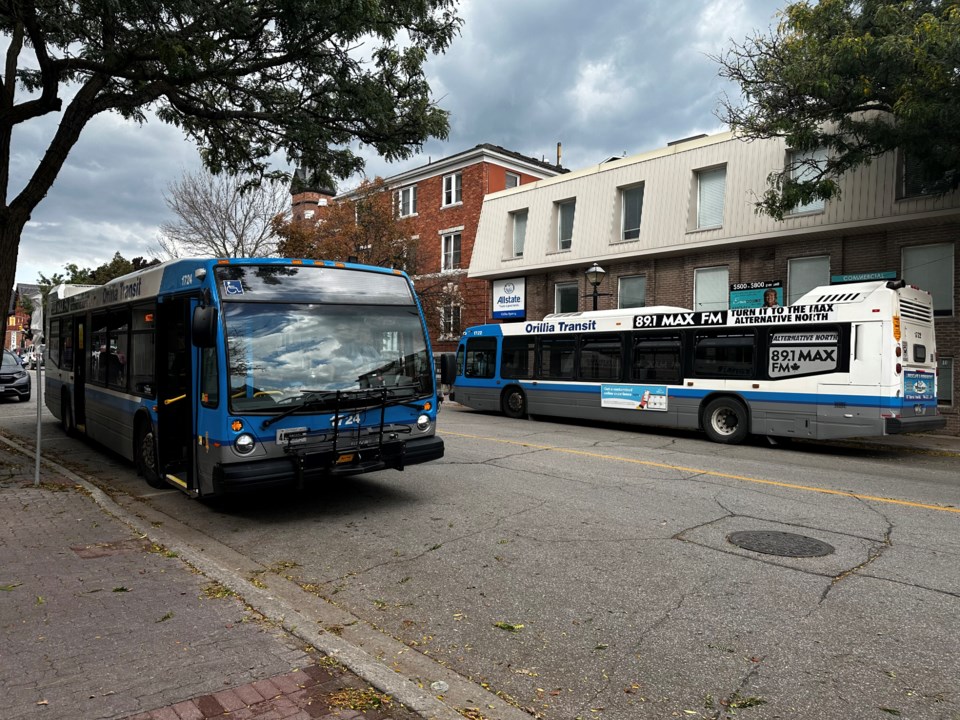City council has agreed to more than double the budget for its transit electrification study, which will see its cost climb from $60,000 to $125,000.
As part of the ‘big moves’ outlined in the city’s climate change action plan, the study aims to put together a full fleet electrification plan for the city’s transit service, carry out route modelling, schedule optimization, as well as provide site assessment of the future Orillia transit facility.
Although council approved the budget hike, several members of council spoke against it at Monday’s council meeting.
Citing extensive issues with Edmonton’s $60-million electric transit fleet, Mayor Don McIsaac questioned the viability of transit electrification at this point in time.
“I can't support this at this point. I think it's too premature. I've studied the Edmonton analysis — that company is bankrupt … more than half the buses were not in service,” he said.
“In North America, I think there were more than 600 buses, and less than half of them are working. This is the bleeding edge, not the leading edge," said the mayor.
“As much as I support the climate change action plan, and this is (one of its) big moves, I don't think this is the right time to do this," said McIsaac.
During the meeting, city staff explained Edmonton — because of its supplier’s bankruptcy — has run into difficulties sourcing parts and carrying out mechanical work on its fleet, and that its fleet has had issues “meeting its intended useful distances.”
Despite this, the majority of council spoke in favour of carrying out the study.
“We're a long way from making any definitive decisions,” said Coun. Tim Lauer.
“I'm actually not convinced EV (electric vehicles) will work with buses — I think maybe hydrogen might be the better choice … but at one point in time we will have to make that decision, (and) we should have as much information in front of us as we can," said the long-time Ward 4 councillor.
“Just like in gasoline, the history of gasoline vehicles, there have been manufacturers that didn't do a particularly good job and are no longer around, and I think the example (from) out west is an example of that,” said Coun. David Campbell.
When asked about the reason for the budget hike, city staff explained that Metrolinx estimated the study would cost about $60,000, but when it was put out to tender the actual cost was $125,000.
“When this was approved as a 2023 capital project, which was formulated basically mid-way through 2022, (it was) based on pricing that Metrolinx had provided to us as an estimate of costs,” said Ian Sugden, the city's general manager of development services and engineering. “When we finally got it out to tender, it was not in that same ballpark.”
The study is eligible for an 80 per cent funding subsidy from Infrastructure Canada’s Zero Emission Transit Fund, but no decision has been made on whether the city will receive funding for the study.
“I think this project absolutely meets the criteria of getting the funding, and that would be my hope — that we'll get the funding and the majority of it will be covered anyway,” said Campbell.
Coun. Janet-Lynne Durnford questioned whether the study will address viability concerns around electric transit fleets, but city staff said it focuses more on how to implement an electric fleet if that’s the direction the city heads in.
“It's starting with the assumption that if you're going to have an electric bus fleet, here's what you need to do,” Sugden said.
With regard to the questions surrounding electric buses, Sugden assured city politicians the study will not commit the city to electrifying its fleet.
“Certainly, there's lots of uncertainties in the electric vehicle market, especially for medium and heavy duty vehicles, so the study is not going to commit us to move in that direction or to buy any electric vehicles of this size,” he said. “It's really just going to give us, if you're going to do that, here's the types of things you need to consider.”
